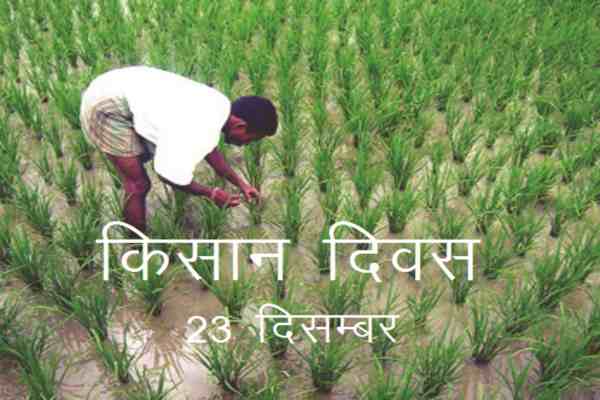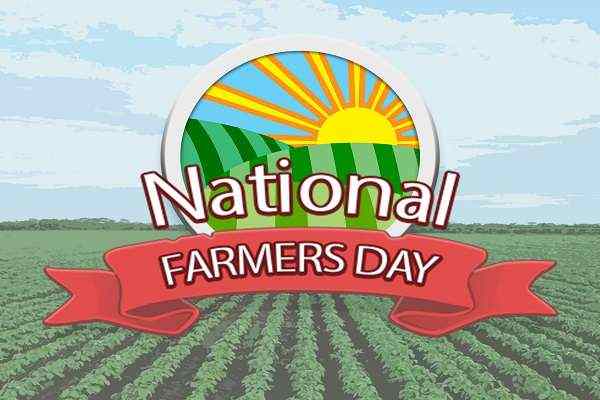Kisan diwas 2022:भारत किसानों की भूमि है। इसे इसलिए कहा जाता है क्योंकि अधिकांश भारतीय कृषि गतिविधियों में सीधे या अप्रत्यक्ष रूप से शामिल होते हैं। इस दिन, घटना के जश्न मनाने के लिए कृषि के आसपास कई बहस, घटनाएं, सेमिनार, कार्य और प्रतियोगिताओं का आयोजन किया जाता है।
राष्ट्रीय उत्साह दिवस देश भर में उत्साह और रुचि के साथ मनाया जाता है। भारत के पूर्व प्रधान मंत्री चौधरी चरण सिंह के सम्मान में राष्ट्रीय किसान दिवस मनाया जाता है।
इस दिन quotes अपने व्हाट्सप्प स्टेटस पर लगा सकते है| या व्हाट्सप्प पर wishes सेंड कर सकते है|
Kisan divas bhashan
इस दिन पर बहुत से स्कूल एवं विश्विद्यालय में essay और speech compatition होता है|
किसान दिवस कब मनाया जाता है: किसान दिवस हर साल राष्ट्रीय किसान दिवस 23 दिसंबर को मनाया जाता है।
भारत एक कृषि प्रधान देश है । हमारी सम्पन्नता हमारे कृषि उत्पादन पर निर्भर करती है । इस लक्ष्य की प्राप्ति के लिये भारतीय कृषक की एक बड़ी भूमिका है । वास्तव में भारत कृषकों की भूमि है । हमारी 75% जनता गांवों में रहती है ।
भारतीय किसान का सर्वत्र सम्मान होता है । वह ही सम्पूर्ण भारतवासियों के लिए अन्न एवं सब्जियाँ उत्पन्न करता है । पूरा वर्ष भारतीय कृषक खेत जोतने बीज बोने एव फसल उगाने में व्यस्त रहता है । वास्तव में उसका जीवन अत्यन्त व्यस्त होता है ।
वह प्रात: तड़के उठता है और अपने हल एव बैल लेकर खेतों की ओर चला जाता है । वह घन्टों खेत जोतता है । तत्पश्चात नाश्ता करता है । उसके घर-परिवार के सदस्य उसके लिये खेत में खाना लाते हैं । उसका खाना बहुत साधारण होता है ।
इसमें अधिकतर चपाती (रोटी) अचार एवं लस्सी (छाछ) होती है । खाने के पश्चात् पुन: वह अपने काम में व्यस्त हो जाता है । वह कठिन परिश्रम करता है । किन्तु कठिन परिश्रम के पश्चात भी उसे बहुत कम लाभ होता है । वह अपनी उपज को बाजार में बहुत कम दामों पर बेचता है ।
कृषक बहुत सादा जीवन जीता है । उसका पहनावा ग्रामीण होता है । वह फूस के झोपड़ी में रहता है हालांकि पँजाब हरियाणा एवं उत्तर प्रदेश के बहुत से कृषकों के पक्के मकान भी हैं । उसकी सम्पत्ति कुछ बैल हल एवं कुछ एकड़ धरती ही होती है । वह अधिकतर अभावों का जीवन जीता है ।
एक कृषक राष्ट्र की आत्मा होता है । हमारे दिवंगत राष्ट्रपति श्री लाल बहादुर शास्त्री ने नारा दिया था ‘जय किसान जय जवान’ । उन्होंने कहा था कि कृषक राष्ट्र का अन्नदाता है । उसी पर कृषि उत्पादन निर्भर करता है । उन्हें कृषि के सभी आधुनिकतम यंत्र एव उपयोगी रसायन उपलब्ध कराने चाहिये ताकि वह अधिक उत्पादन कर सके ।
Kisan diwas speech 400 words
National Farmers Day or Kisan Diwas is celebrated in the honor of Chaudhary Charan Singh who was the fifth Prime Minister of India. He served the country as Prime Minister for a very short tenure starting from 28th of July 1979 till 14th January 1980. He was a very simple-minded man and led an extremely simple life. During his tenure as the Prime Minister, he introduced many policies to improve the life of Indian farmers.
The magnetic personality of Chaudhary Charan Singh and various beneficial policies in the favor of farmers united all the farmers of India against the landlords and moneylenders. He followed the famous slogan ‘Jai Jawan Jai Kisan’ given by the 2nd Prime Minister of India. Chaudhary Charan Singh was also a very successful writer and wrote down several books depicting his thoughts on farmers and their problems; he even came out with various solutions to improve the lives of farmers.
Chaudhary Charan belonged to the farmer’s family and thus he led an extremely simple life despite being the honorable Prime Minister of India. India is primarily the land of villages and majority of the population living in villages are farmers and agriculture is the main source of income for them. 70% of the Indian population still today thrives on the income generated through cultivation. India witnesses an interesting farming journey.
The green revolution during the 60s evolved in Punjab and Haryana transformed the agricultural picture of the country. This increased the productivity and thus India became self-sufficient in various agro-commodities.
Farmers are the spine of India. The nation of lands, India celebrates Nationals Farmer’s Day every year on 23rd of December to pay honor to the great work done by the farmers of our country.
Chaudhary Charan Singh was the Jat icon and belonged to a peasant family. This was the reason he could relate himself with the issues of the farmers and therefore, he did the best to support them. When he became the Prime Minister of India in July 1979 he made many changes to improve the lives of the farmers. This is also an interesting fact that as the Prime Minister of India, Chaudhary Charan Singh never visited the Lok Sabha. He also served as the Deputy Prime Minister during the reign of Morarji Desai.
He introduced Budget 1979 which was designed to accomplish the needs of the farmers in all respects. It had several policies in favor of Indian farmers. These initiatives of the great Kisan leader boost the confidence of all the farmers and gave them strength to stand together against the landlords and moneylenders. The Agricultural Produce was the famous Market Bill introduced by Chaudhary Charan Singh in the Assembly. The Bill was meant to safeguard the wellbeing of the farmers against the greediness of the dealers and the landlords. The Zamindari Abolition Act was also introduced and enforced by him.
The famous “Kishan Ghat” in New Delhi is dedicated to Chaudhary Charan Singh due to his involvement with the causes related to farmer’s communities in the North. He was an avid writer too and wrote down his thoughts on farmers and problems related to them along with the solutions. Chaudhary Charan Singh died on 29 May 1987.
Kisan divas farmer’s day speech

त्याग और तपस्या का दूसरा नाम है किसान । वह जीवन भर मिट्टी से सोना उत्पन्न करने की तपस्या करता रहता है । तपती धूप, कड़ाके की ठंड तथा मूसलाधार बारिश भी उसकी इस साधना को तोड़ नहीं पाते । हमारे देश की लगभग सत्तर प्रतिशत आबादी आज भी गांवों में निवास करती है । जिनका मुख्य व्यवसाय कृषि है ।
एक कहावत है कि भारत की आत्मा किसान है जो गांवों में निवास करते हैं । किसान हमें खाद्यान्न देने के अलावा भारतीय संस्कृति और सभ्यता को भी सहेज कर रखे हुए हैं । यही कारण है कि शहरों की अपेक्षा गांवों में भारतीय संस्कृति और सभ्यता अधिक देखने को मिलती है । किसान की कृषि ही शक्ति है और यही उसकी भक्ति है ।
वर्तमान संदर्भ में हमारे देश में किसान आधुनिक विष्णु है । वह देशभर को अन्न, फल, साग, सब्जी आदि दे रहा है लेकिन बदले में उसे उसका पारिश्रमिक तक नहीं मिल पा रहा है । प्राचीन काल से लेकर अब तक किसान का जीवन अभावों में ही गुजरा है । किसान मेहनती होने के साथ-साथ सादा जीवन व्यतीत करने वाला होता है ।
समय अभाव के कारण उसकी आवश्यकतायें भी बहुत सीमित होती हैं । उसकी सबसे बड़ी आवश्यकता पानी है । यदि समय पर वर्षा नहीं होती है तो किसान उदास हो जाता है । इनकी दिनचर्या रोजाना एक सी ही रहती है । किसान ब्रह्ममुहूर्त में सजग प्रहरी की भांति जग उठता है । वह घर में नहीं सोकर वहां सोता है जहां उसका पशुधन होता है ।
उठते ही पशुधन की सेवा, इसके पश्चात अपनी कर्मभूमि खेत की ओर उसके पैर खुद-ब-खुद उठ जाते हैं । उसका स्नान, भोजन तथा विश्राम आदि जो कुछ भी होता है वह एकान्त वनस्थली में होता है । वह दिनभर कठोर परिश्रम करता है । स्नान भोजन आदि अक्सर वह खेतों पर ही करता है । सांझ ढलते समय वह कंधे पर हल रख बैलों को हांकता हुआ घर लौटता है ।
कर्मभूमि में काम करने के दौरान किसान चिलचिलाती धूप के दौरान तनिक भी विचलित नहीं होता । इसी तरह मूसलाधार बारिश या फिर कड़ाके की ठंड की परवाह किये बगैर किसान अपने कृषि कार्य में जुटा रहता है । किसान के जीवन में विश्राम के लिए कोई जगह नहीं है ।
वह निरंतर अपने कार्य में लगा रहता है । कैसी भी बाधा उसे अपने कर्तव्यों से डिगा नहीं सकती । अभाव का जीवन व्यतीत करने के बावजूद वह संतोषी प्रवृत्ति का होता है । इतना सब कुछ करने के बाद भी वह अपने जीवन की आवश्यकतायें पूरी नहीं कर पाता । अभाव में उत्पन्न होने वाला किसान अभाव में जीता है और अभाव में इस संसार से विदा ले लेता है ।
अशिक्षा, अंधविश्वास तथा समाज में व्याप्त कुरीतियां उसके साथी हैं । सरकारी कर्मचारी, बड़े जमीदार, बिचौलिया तथा व्यापारी उसके दुश्मन हैं, जो जीवन भर उसका शोषण करते रहते हैं । आज से पैंतीस वर्ष पहले के किसान और आज के किसान में बहुत अंतर आया है । स्वतंत्रता प्राप्ति के पश्चात किसान के चेहरे पर कुछ खुशी देखने को मिली है ।
अब कभी-कभी उसके मलिन-मुख पर भी ताजगी दिखाई देने लगती है । जमीदारों के शोषण से तो उसे मुक्ति मिल ही चुकी है परन्तु वह आज भी पूर्ण रूप से सुखी नहीं है । आज भी 20 या 25 प्रतिशत किसान ऐसे हैं जिनके पास दो समय का भोजन नहीं है । शरीर ढकने के लिए कपड़े नहीं हैं । टूटे-फूटे मकान और टूटी हुई झोपड़ियाँ आज भी उनके महल बने हुए हैं ।
हालांकि स्वतंत्रता प्राप्ति के बाद से किसान के जीवन में कुछ खुशियां लौटी हैं । सरकार ने ही किसानों की ओर ध्यान देना शुरू किया है । उनके अभावों को कम करने के प्रयास में कई योजनाएं सरकार द्वारा चलाई जा रही हैं । किसानों को समय-समय पर गांवों में ही कार्यशाला आयोजित कर कृषि विशेषज्ञों द्वारा कृषि क्षेत्र में हुए नये अनुसंधानों की जानकारी दी जा रही है ।
इसके अलावा उन्हें रियायती दर पर उच्च स्तर के बीज, आधुनिक कृषि यंत्र, खाद आदि उपलब्ध कराये जा रहे हैं । उनकी आर्थिक स्थिति सुधारने व व्यवसायिक खेती करने के लिए सरकार की ओर से बहुत कम ब्याज दर पर ऋण मुहैया कराया जा रहा है ।
खेतों में सिंचाई के लिए नहरों व नलकूपों का निर्माण कराया जा रहा है । उन्हें शिक्षित करने के लिए गांवों में रात्रिकालीन स्कूल खोले जा रहे हैं । इन सब कारणों के चलते किसान के जीवन स्तर में काफी सुधार आया है । उसकी आर्थिक स्थिति भी काफी हद तक सुदृढ़ हुई है ।
Farmers day Speech – 500 words
ऊपर हमने आपको farmer’s day, kisan diwas kab manaya jata hai, mahila kisan diwas, kisan diwas wikipedia, kisan diwas date, akhil bhartiya kisan diwas, kisan diwas quotes, a farmer’s day speech आदि की जानकारी किसी भी भाषा जैसे Hindi, Urdu, उर्दू, English, sanskrit, Tamil, Telugu, Marathi, Punjabi, Gujarati, Malayalam, Nepali, Kannada के Language Font में साल 2007, 2008, 2009, 2010, 2011, 2012, 2013, 2014, 2015, 2016, 2017 का full collection whatsapp, facebook (fb) व instagram पर share कर सकते हैं|
Introduction
Persons like me, who have lived in cities for the whole of their lives, have a very wrong idea about village life. They believe what is shown in Bollywood movies. I was no different. I also thought that in villages, women move around in their designer lehengas. They go to the well for fetching water and move here and there happily. I also believed that in the evening they gather around and danced together on the movie songs like “sun mitwa” or “mere desh ki dharti”.
Life of an Indian farmer
One fine day I told my dad, “what a nice life these village folks have…”. On this my dad laughed loudly and suggested me to visit our ancestral village which is in Lucknow. Last time when I went to our village, I was 4 years old. I remembered very few details from my last visit or better to say I had no idea what a village looked like.
I took a week’s leave from office and boarded the train with my father. I was really very excited. At the railway station we were greeted by our relative (my cousin brother) who had come to receive us. I asked him, “how we will go home”? On this, he showed his bullock cart. On this my reaction was, “What!”. My dad told me, “son, this is just the beginning….”.
On reaching home firstly, I decided to answer my natures call. So, I asked, “where is the toilet”? On this I was took to an open field. I was told that there is no toilet in the village and all the villagers including women have to go in the open field. After that I decided to have a look around. I found broken houses made with mud and bamboo with men and women in old and torn clothes (definitely not designer), working very hard in fields to get their ends meet.
An used plow and a pair of feeble bullock stands in every house as a testimony to the strenuous life of the occupants. Maximum houses had no electricity connection and even those houses which had electricity connection used oil lamps because electricity was rare. Nobody had a gas connection, so food was cooked on wooden or coal fire which generated smoke and that caused various lung diseases.
I found an old woman coughing. I asked her, “Are you having your medicines”? On this she gave a blank look and said, “Beta, I don’t have money to buy medicines or go to a private hospital.” Other persons told me that the there is no government clinic nearby. On hearing this I really got emotional. The plight of the Indian farmers is unimaginable as they work tirelessly throughout the year in the absence of basic necessities.
I decided to join my cousin brother who was working in the fields. When I reached there, I found him and some other farmers arguing with some men. I was told that they were bank officials and had come to give a formal notice (of non-payment of EMIs) to the farmers. My cousin brother told me that no body in the village was able to pay EMIs this time as they had a bad crop this time.
I ate my food and went to sleep. After some time, I woke up to drink water. I found bantu (my cousin brother’s son) reading in candle light. I asked, “its late, go to sleep”. On this he replied, “Uncle, I have a test tomorrow”. On listening this I felt that everything is not lost and there is still a ray of hope.









